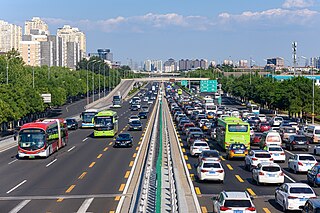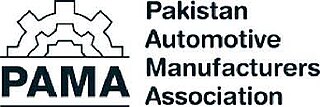Related Research Articles

SAIC Motor Corp., Ltd. is a Chinese state-owned automobile manufacturer headquartered in Anting, Shanghai. Founded in 1955, it is currently the largest of the "Big Four" state-owned car manufacturers of China ahead of FAW Group, Dongfeng Motor Corporation, and Changan Automobile, with sales of 5.02 million vehicles in 2023.

Iran’s automotive industry is the third most active industry of the country, after its oil and gas industry, accounting for 10% of Iran's GDP and 4% of the workforce.
Changan Automobile Co., Ltd.(CCAG) is a Chinese state-owned automobile manufacturer headquartered in Jiangbei, Chongqing. Changan Automobile traces its origins back to 1862 when Li Hongzhang set up a military supply factory, the Shanghai Foreign Gun Bureau. It was not until 1959 when the factory was repurposed to manufacture Changjiang Type 46 jeep that it became an automobile manufacturer.

China FAW Group Corp., Ltd. is a Chinese state-owned automobile manufacturer headquartered in Changchun, Jilin. Founded on 15 July 1953, it is currently the second largest of the "Big Four" state-owned car manufacturers of China, together with SAIC Motor, Dongfeng Motor Corporation and Changan Automobile.
In the United States automotive industry, the term Big Three is used for the country's three largest motor vehicle manufacturers, especially indicating companies that sell under multiple brand names.

Korea Automobile Manufacturers Association, or KAMA, is a South Korean automobile and motor vehicle association National Assembly in July 1988. KAMA is a non-profit organization, representing the interests of automakers in Korea.

The automotive industry inmainland China has been the largest in the world measured by automobile unit production since 2008. As of 2024, mainland China is also the world's largest automobile market both in terms of sales and ownership.

Guangzhou Automobile Group Co., Ltd. is a Chinese state-owned automobile manufacturer headquartered in Guangzhou, Guangdong. Founded in 1954, it is currently the fifth largest automobile manufacturer in China, with 2.144 million sales in 2021.
The Auto Alliance (AAM) is a defunct trade group of automobile manufacturers that operated in the United States. It was the leading advocacy group for the auto industry, representing 77% of all car and light truck sales in the United States. The Auto Alliance was active in the areas of environment, energy and motor vehicle safety. In 2019, the Alliance was merged with the Association of Global Automakers to form the Alliance for Automotive Innovation. John Bozzella of Global Automakers became the new CEO.
The 2008–2010 automotive industry crisis formed part of the 2007–2008 financial crisis and the resulting Great Recession. The crisis affected European and Asian automobile manufacturers, but it was primarily felt in the American automobile manufacturing industry. The downturn also affected Canada by virtue of the Automotive Products Trade Agreement.
The Motor Vehicle Owners' Right to Repair Act, sometimes also referred to as Right to Repair, is a name for several related proposed bills in the United States Congress and several state legislatures which would require automobile manufacturers to provide the same information to independent repair shops as they do for dealer shops.

Beijing Automotive Group Co., Ltd. is a Chinese state-owned automobile manufacturer headquartered in Shunyi, Beijing. Founded in 1958, it is the sixth largest automobile manufacturer in China, with 1.723 million sales in 2021.

The automotive industry in Canada consists primarily of assembly plants of foreign automakers, most with headquarters in the United States or Japan, along with hundreds of manufacturers of automotive parts and systems, a sector represented by the APMA.

In the United States, the automotive industry began in the 1890s and, as a result of the size of the domestic market and the use of mass production, rapidly evolved into the largest in the world. The United States was the first country in the world to have a mass market for vehicle production and sales and is a pioneer of the automotive industry and mass market production process. During the 20th century, global competitors emerged, especially in the second half of the century primarily across European and Asian markets, such as Germany, France, Italy, Japan and South Korea. The U.S. is currently second among the largest manufacturers in the world by volume.
The Automobile Manufacturers Association was a trade group of automobile manufacturers that operated under various names in the United States from 1911 to 1999. It was replaced by the Alliance of Automobile Manufacturers.
This article provides an overview of the automotive industry in countries around the world.

The automotive industry in Japan is one of the most prominent and largest industries in the world. Japan has been in the top three of the countries with the most cars manufactured since the 1960s, surpassing Germany. The automotive industry in Japan rapidly increased from the 1970s to the 1990s and in the 1980s and 1990s, overtook the U.S. as the production leader with up to 13 million cars per year manufactured and significant exports. After massive ramp-up by China in the 2000s and fluctuating U.S. output, Japan is currently the third largest automotive producer in the world with an annual production of 9.9 million automobiles in 2012. Japanese investments helped grow the auto industry in many countries throughout the last few decades.

The Alliance for Automotive Innovation (AAI) is a Washington, D.C.–based trade association and lobby group whose members include international car and light duty truck manufacturers that build and sell products in the United States.

Qoros Auto Co., Ltd. was a Chinese automotive manufacturing company headquartered in Shanghai, China. Its principal activity was the design, development, production and sale of passenger cars sold under the Qoros marque.

The Pakistan Automotive Manufacturers Association (PAMA) (Urdu: پاکستان موٹر گاڑی تولید کننده تنظیم) is a trade group of automobile manufacturers that operate in Pakistan.
References
- ↑ Wimmer, Engelbert (December 2, 2011). Motoring the Future: VW and Toyota Vying for Pole Position. Palgrave Macmillan. pp. 393–. ISBN 9780230318861 . Retrieved June 3, 2013– via Google Books.
- ↑ "US, China talk trade as Beijing targets automakers". The Hindu . October 29, 2009. Retrieved June 3, 2013.[ dead link ]
- ↑ "About AAPC". AAPC. 2012-04-11. Archived from the original on 2021-04-11. Retrieved 2018-08-15.